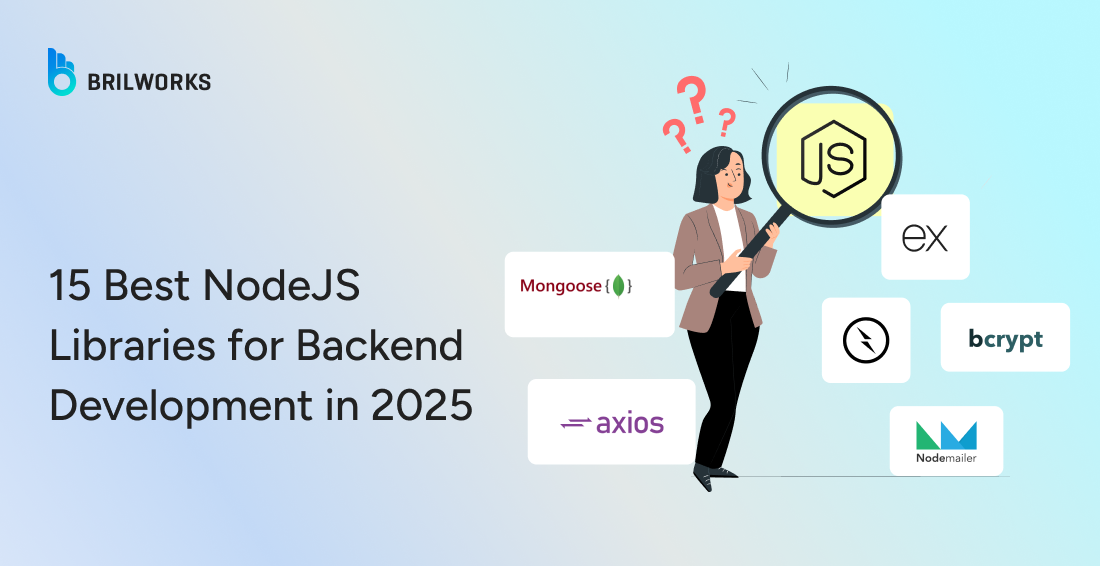COOPERATION MODEL
ARTIFICIAL INTELLIGENCE
PRODUCT ENGINEERING
DevOps & Cloud
LOW-CODE/NO-CODE DEVELOPMENT
INDUSTRY
FRONTEND DEVELOPMENT
CLOUD DEVELOPMENT
MOBILE APP DEVELOPMENT
LOW CODE/ NO CODE DEVELOPMENT
EMERGING TECHNOLOGIES








Top companies like Netflix, NASA, PayPal, LinkedIn, and Walmart rely on NodeJS. According to the StackOverflow 2024 developer survey, 40 percent of developers prefer Node.js, making it one of the most widely used web technologies. It provides a flexible foundation, especially for teams building mobile apps.
Unlike frameworks like React Native, Node.js is a runtime environment that executes JavaScript outside the browser. Its true potential comes from the libraries you integrate, which simplify tasks such as API handling, authentication, database queries, and background jobs.
Choosing the right libraries can save development time, reduce errors, and ensure your backend is ready to scale. In this guide, we cover 15 essential NodeJS libraries for 2025 and explain how to make the best choices for your project.
Need innovative Node.js solutions? Hire Node.js developers who bring fresh perspectives and deep technical expertise to build what others can't.
Node.js is still a favorite among startups, tech teams, and product companies because it is fast, flexible, and suitable for modern development. Whether you are building a mobile app, developing cloud APIs, or managing real-time data, Node.js fits perfectly.
Its non-blocking, event-driven model allows it to handle multiple requests at the same time, so applications remain responsive under heavy traffic.
Another advantage is that you can use JavaScript on both frontend and backend, which simplifies development and creates consistency. For instance, using React or ReactJS on the frontend and Node.js on the backend allows teams to work more efficiently.
If you need expert guidance, you can also hire Node.js developers to implement high-performance solutions and ensure your architecture is robust
Here is a carefully curated list of NodeJS libraries that remain relevant and widely used in 2025:
Express.js is a lightweight web framework for Node.js that simplifies server-side development. It offers routing, middleware, and HTTP utilities with minimal setup.
Key Features:
Lightweight and flexible structure
Routing and middleware support
Large ecosystem of plugins
Compatible with ES6+, TypeScript, and templating engines
Use Cases:
RESTful APIs
Mobile backends with React Native
Microservices or serverless functions
Rapid MVP development
Tip: Use express.json() for parsing JSON payloads and combine with Joi for API validation.
Socket.IO enables real-time, bi-directional communication between clients and servers. It is ideal for chat apps, dashboards, and collaborative tools.
Key Features:
Event-driven, real-time messaging
Auto-reconnect and failover
Room and namespace management
Works with Express and frontend libraries like React
Use Cases:
Real-time chat and notifications
Collaborative editing tools
Live dashboards and analytics
Mongoose provides an object modeling interface for MongoDB, adding structure to otherwise flexible schemas.
Key Features:
Schema-based modeling with validation
Middleware hooks for lifecycle events
Supports nested documents and population
Seamless integration with MongoDB Atlas
Use Cases:
MongoDB-backed applications
REST APIs or GraphQL services
Mobile app backends
Axios is a promise-based HTTP client for Node.js and the browser, making API requests simple and consistent.
Key Features:
Async/await support
Request and response interceptors
Automatic JSON handling
Request cancellation and timeout
Use Cases:
Calling third-party APIs
Microservices communication
Server-side rendering (SSR) apps
Bcrypt is a library for securely hashing passwords, making them resistant to brute-force attacks.
Key Features:
Salted hashing
Adjustable cost factor
Sync and async versions
Use Cases:
User authentication
Cloud-based credential storage
Sensitive backend applications
Lodash offers utility functions for arrays, objects, and strings, streamlining common JavaScript operations.
Key Features:
Over 300 utility functions
Deep cloning and object merging
Debounce, throttle, and memoization
Modular imports
Use Cases:
Data processing in APIs
Transforming third-party data
Simplifying backend logic
Winston is a logging library for Node.js, helping track application behavior and errors.
Key Features:
Multiple log levels
Custom formats and JSON logging
Transports for console, files, HTTP, or external services
Use Cases:
Monitoring and debugging Node.js apps
Logging microservices
Compliance logging
Passport.js handles authentication with over 500 strategies, including OAuth and JWT.
Key Features:
Integrates with Express
Works with sessions or JWT flows
Modular and extensible
Use Cases:
OAuth login for SaaS platforms
Authentication for React Native apps
API protection
Tip: Pair with Bcrypt for secure password management.
Jest is a testing framework for Node.js and JavaScript, designed for minimal setup.
Key Features:
Snapshot testing
Built-in assertions and mocking
Works with Babel, TypeScript, ES modules
Use Cases:
Unit testing backend functions
Testing microservices
Test-driven development
Nodemailer allows Node.js apps to send emails, including transactional messages and attachments.
Key Features:
SMTP, Gmail, Outlook support
HTML, text, attachments
Secure connections via OAuth2 or SSL/TLS
Use Cases:
Verification and password reset emails
Transactional notifications
Integration with Express.js
PM2 is a production process manager for Node.js apps. It helps keep services running, manage logs, and monitor performance.
Key Features:
Automatic restarts
Load balancing
Logging and metrics
Deployment workflow support
Use Cases:
Production backend services
Managing background jobs
Ensuring uptime for APIs
Sequelize is an ORM for SQL databases, letting you use JavaScript instead of raw SQL.
Key Features:
Supports PostgreSQL, MySQL, MariaDB, SQLite, SQL Server
Model validation and associations
Migration and seeding tools
Async/await support
TypeScript compatible
Use Cases:
Managing relational data
Mobile and web app backends
Database migrations
Dotenv loads environment variables from a .env file, keeping secrets separate from code.
Key Features:
Simple syntax
Keeps credentials out of source control
Compatible with PM2, Sequelize, Express
Use Cases:
Managing API keys and secrets
Dev, staging, production configuration
Puppeteer automates Chrome or Chromium, enabling scraping, testing, and PDF generation.
Key Features:
Full browser control
Screenshot and PDF generation
Headless and non-headless modes
Use Cases:
Scraping dynamic websites
Automated UI testing
PDF generation
SEO testing for SPAs (React)
Async manages complex asynchronous workflows in Node.js, even in large-scale applications.
Key Features:
Parallel, series, waterfall, queue execution
Supports callbacks and promises
Concurrency and rate-limiting
Use Cases:
Multi-step backend operations
Batch processing
Refactoring older callback-based code
Not every library is suitable for every project. Here’s how to pick the best tools:
Define Requirements: Identify authentication, database, email, logging, or real-time needs. Focus on libraries that solve your core problems.
Check Popularity and Community: Look at GitHub stars, downloads, and maintenance activity. Libraries like Axios, Socket.IO, and Bcrypt have strong support.
Evaluate Documentation: Clear documentation helps your team adopt libraries faster. IDEs also improve efficiency, see 8 Best Node JS IDEs You Should Try This Year.
Check Compatibility: Libraries should work with your stack, including ReactJS and React Native.
Prioritize Performance and Security: Choose lightweight libraries with minimal vulnerabilities and regular updates.
Consider Long-Term Maintenance: Active and well-maintained libraries reduce future refactoring efforts.
Choosing the right NodeJS library is one of the most critical decisions in backend development. The libraries listed here cover everything from authentication and API handling to real-time communication and production monitoring.
If you want expert guidance, hire Node.js developers to help implement the right architecture, select the best tools, and ensure high performance.
Are you ready to enhance your backend systems using Node.js? Let’s talk.
NodeJS libraries help developers simplify common backend tasks like routing, database access, authentication, testing, and performance monitoring. They save time, reduce code complexity, and offer reusable components for building scalable backend applications.
For secure authentication, Passport.js and Bcrypt remain the top choices. Passport.js supports over 500 strategies, including OAuth and JWT, while Bcrypt ensures passwords are securely hashed. Together, they create a reliable authentication system for Node.js backends.
Express.js is still the most popular framework for RESTful APIs. Its lightweight structure, middleware support, and extensive ecosystem make API development fast and flexible. Pairing it with Mongoose for MongoDB or Sequelize for SQL databases makes your backend robust.
Socket.IO provides real-time, event-based communication between server and client. It's ideal for chat apps, dashboards, and collaborative platforms, offering automatic reconnections and efficient room management.
Dotenv is the standard choice. It loads configuration values from .env files, keeping credentials, API keys, and environment-specific settings separate from your code.
Jest is the preferred testing framework. It supports unit tests, integration tests, and snapshot testing, and integrates seamlessly with modern stacks like TypeScript, Babel, and ES modules.
PM2 is an efficient process manager that ensures apps stay alive, handles automatic restarts, load balancing, and monitors performance. It's essential for production environments.
Yes, Puppeteer allows automation of Chrome or Chromium, enabling screenshot capture, PDF creation, web scraping, and automated UI testing for SPAs built with React.
Absolutely. Node.js pairs perfectly with React Native backends. Libraries like Express.js, Mongoose, Axios, and Passport.js ensure your mobile apps are fast, secure, and scalable.
Get In Touch
Contact us for your software development requirements
Get In Touch
Contact us for your software development requirements